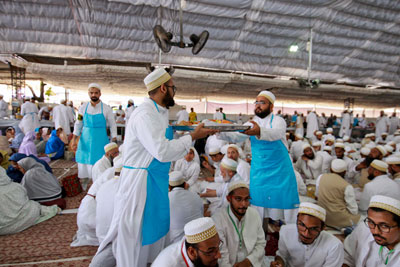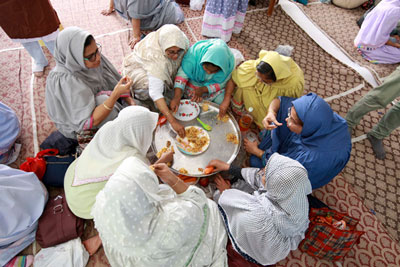News
Shining lesson on zero food wastage policy at massive Bohra conference

In a collective effort to minimise waste, the Dawoodi Bohra community adopted a zero food wastage policy during their global conference in Colombo from September 1-10 which is being attended by more than 21,000 Dawoodi Bohra members from over 40 countries.
As some 60,000 meals were being prepared daily, a Dana (Grain) committee including 6000 volunteers initially assessed the amount of food needed through data from RSVP apps and other web and mobile based platforms.
“Today we fed an estimated count of 24,000 thousand people with over 3000 thaals. We have devised a method to see how much food one thaal might need and serve accordingly. Our high priest Syedna Aliqadr Saifuddin is constantly teaching us not to waste food and understand that we live amongst a lot of communities and we need to respect everything especially our resources,” Sakina Juzar, one of the volunteers told the Sunday Times.
Murtaza Sadriwala of the organising committee said, “We realized food wastage is one of the critical aspects we need to focus on, because there are so many people dying of hunger.”

Posters were put up in communal halls where meals are served to constantly reinforce the message of zero food wastage. Before every meal, a short announcement was made to remind attendees of the zero food wastage policy. The food is served on a thaal (a traditional large steel platter for ![]() and attendees are urged to serve only what they required.
and attendees are urged to serve only what they required.
After the meal, committee members examine every thaal and consume any leftovers. Even the sufrah (a square piece of cloth placed under the thaal) is checked for any morsels left behind.
Any extra food is packed in containers and placed near the exit of the communal hall for members to take away. More leftovers are despatched to designated distribution areas for the homeless and needy.
Around 4000 kilograms of organic waste collected each day is sent to be converted into compost for farming communities. The 150-200 kg of polythene and PET bottles, 100 kilograms of plastic and cardboard were being recycled daily to ensure that none of it went into landfills.
Helping the initiative are companies such as Super Compost handling organic waste, Neptune Papers Ltd. recycling paper and Eco-Spindles converting the non-biodegrable waste to usable products.

The subsidiary Nazafat Committee in particular with their motto ‘Cleanliness is integral to belief’ (a saying taken from the Holy Prophet Muhammad (pbuh)), ensured the waste was disposed to correct authorities

